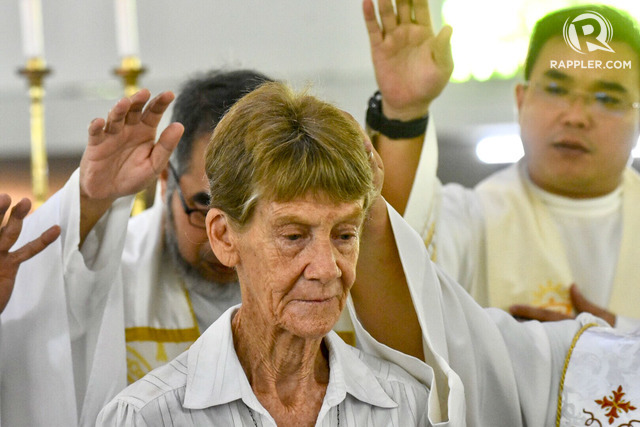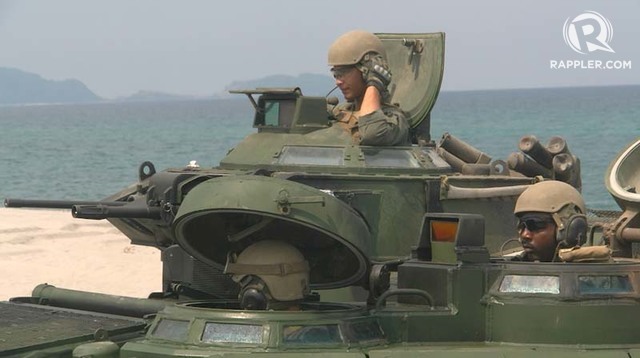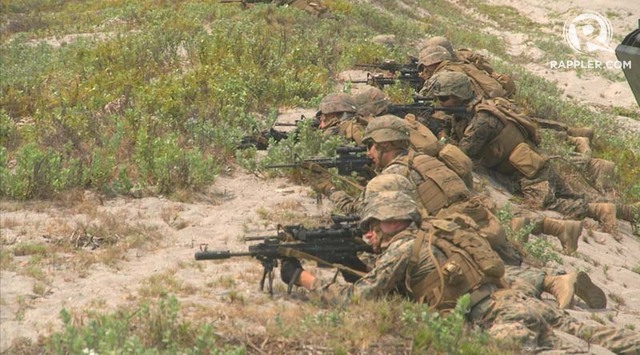Amid South China Sea dispute, President Rodrigo Duterte balks at pushing back after landmark maritime rights ruling.
![Philippines' lacklustre fight in the South China Sea Protesters demonstrate outside the Chinese consulate against China's militarisation of disputed islands [Bullit Marquez/AP]](https://www.aljazeera.com/mritems/imagecache/mbdxxlarge/mritems/Images/2018/5/22/f6a6cfcf8e9e4f1aa027a5bf4618ed3a_18.jpg)
Protesters demonstrate outside the Chinese consulate against China's militarisation of disputed islands [Bullit Marquez/AP]
"I cannot go to war with China," says Philippines President Rodrigo Duterte whenever he is pressed about his country's challenged sovereignty claim over a portion of the South China Sea.
It's the same line he told his Navy on its 120th anniversary on Tuesday. Although appreciative of the sailors' "gallant" efforts to defend the archipelago's maritime territory, Duterte implicitly acknowledged their inferiority to their Chinese counterparts.
"I cannot go into a battle that I cannot win," he said before the Navy's ranks and top brass.
It's a decidedly "defeatist" stance Duterte has taken, his critics point out, and they say he is partly to blame for China's audacity in continuing to militarise its garrisons in the Spratly and Paracel island groups despite calls from several countries that it stop.
That is because the Philippines has not joined those calls, when it is the one country that possesses an ace card that could possibly trump China's military might: a UN-backed arbitral award that debunks China's sweeping claim over the South China Sea, and affirms its own exclusive rights to 200 nautical miles of sea from its shores.
Because Duterte has chosen to set the ruling aside in hopes of wooing China, analysts believe the Philippines is now losing the dispute to its more aggressive neighbor.
"If the government continues on its present track, the arbitral ruling will become irrelevant to the realities on the ground within the next year or so," Jay Batongbacal, director of the University of the Philippines Institute of Maritime Affairs and the Law of the Sea, told Al Jazeera.
Bombers and missiles
On Friday, China's People's Liberation Army Air Force announced it deployed bomber planes to one of its outposts in the Paracel Islands, an area also claimed by Vietnam and Taiwan.
Earlier this month, a CNBC report cited US intelligence sources saying China had installed anti-ship cruise missiles and surface-to-air missiles on the Spratly Islands, where the Philippines, Vietnam, Taiwan, Malaysia and Brunei also have overlapping claims.
In both cases, the Philippines falls within striking range of China's weapons, causing alarm among the public and putting pressure on Duterte to take action.
On Monday, his Department of Foreign Affairs said it was "taking the appropriate diplomatic action" to protect the country's claims, but it will not "publicise every action taken".
It was hardly the reaction the Philippine public expected.
In contrast, Vietnam accused China of "increasing tensions and causing regional instabilities", and demanded it halt its militarisation of the area.
The Philippines' acting Chief Justice Antonio Carpio and former foreign affairs secretary Albert Del Rosario, who both helped build and argue the country's case before the UN-backed tribunal in The Hague, criticised the government's response.
Del Rosario said the Duterte government needed to "revisit" its foreign policy, and its decision to shelve the arbitral award cost the country "opportunities to advance [its] position", and enabled China to "work itself into [the Philippines'] backyard".
Since 2015, China has reclaimed seven reefs in the Spratlys and turned them into military-ready installations. The arbitral award states those reefs fall within the Philippines' exclusive economic zone under international maritime law.
Carpio, meanwhile, urged the government to "formally protest" China's actions and to rally other countries that were willing to back the arbitral award.
Otherwise, Carpio said the Philippines would end up a "willing victim of China's third warfare strategy" of intimidating rival claimants with military might.
Addressing Duterte's fear of war with China, Carpio said a formal protest is recognised by the UN Charter as a "peaceful and legitimate response" and, therefore, not a trigger for military confrontation.
'Active collaborator'
Duterte has been criticised widely for citing the possibility of war with China as a pretext for inaction.
In a lecture he gave in July 2017, Carpio said Duterte had a "dismal lack of understanding of international law and relations", pointing out that China would not risk attacking the Philippines because it would activate a mutual defence treaty with the US.
In other words, a war with the Philippines would be a war with the US, which Carpio believed China would not want.
However, for Jose Antonio Custodio, a military analyst and former consultant of the Philippines' National Security Council, Duterte is not just being overly careful.
"The actions of the Duterte administration from day one have seen it breaking away from forging an international consensus against China's territorial ambitions and moving into an active collaborator of Beijing," Custodio told Al Jazeera.
Aside from shelving the arbitral award, Duterte diluted statements of the Association of Southeast Asian Nations (ASEAN) that would have addressed the South China Sea disputes, when he was the bloc's chairman in 2017. He has also continually heaped praise and flattery on China and opened the Philippines to its economic and political influence through aid and loan packages.
These, said Custodio, reveal a Duterte who actively works for China's interests and "spreads an atmosphere of defeatism to justify a shift to a pro-Beijing policy."
'Concern but not a threat'
Aware of such criticism, Duterte's communications team has attempted publicity stunts to portray him as a patriot.
Last week, the president visited a Navy ship about to set out for Benham Rise, a strategic and resource-rich underwater plateau off the country's Pacific coast, which he renamed "Philippine Rise" after Chinese vessels were spotted scouting the area.
Duterte's son and his top aide rode jet skis near the anchored ship, a nod to him saying he would take a jet ski to the Spratlys and plant the national flag on one of China's installations, back when he was still campaigning to be president.
Even Duterte's underlings are careful when speaking about China. Asked about the president's view of the latest developments in the South China Sea, his spokesman said he views China as "a concern but not a threat".
Duterte insists he has few if any options in dealing with China, and so there is nothing to do but "hope for China's mercy".
As for the arbitral award, he claimed - wrongly - that it was not at his disposal but his predecessor's
"Do not believe in that sh*t that it was during my time that the arbitral ruling was handed down. Of course, it was not," he told a public audience on Sunday.
Although the case was largely the effort of former president Benigno Aquino's government, the tribunal released the verdict on July 12, 2016 - two weeks into Duterte's term.
By taking the award for granted, Batongbacal said Duterte "conceded the game prematurely" and his government will only have itself to blame for "squandering its most significant victory in the South China Sea disputes".
https://www.aljazeera.com/news/2018/05/philippines-lacklustre-fight-south-china-sea-180522174023071.html








